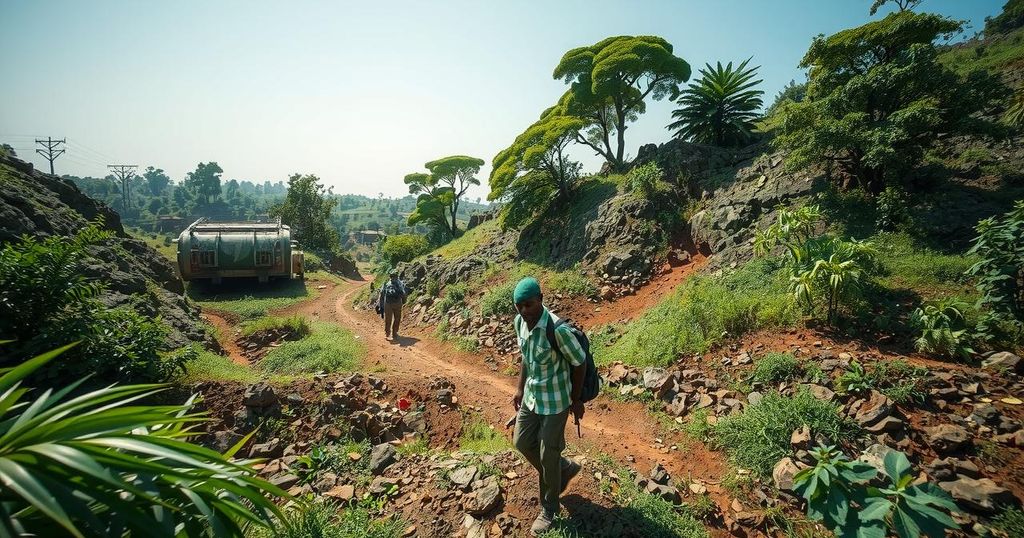Global news
AFC, AFRICA, ANGOLA, CIVIL WAR, CONFLICT RESOLUTION, CONGO, CONGO (KINSHASA), CONGO RIVER ALLIANCE, DEMOCRATIC REPUBLIC OF CONGO, FELIX TSHISEKEDI, JASON STEARNS, KINSHASA, M2, MILITARY, NORTH AMERICA, PAUL KAGAME, REUTERS, SECURITY, SIMON FRASER UNIVERSITY, SONIA ROLLEY, TRES, TRESOR KIBANGULA, TS, TSHISEKEDI, UNITED STATES, WEST AFRICA
Isaac Bennett
0 Comments
M23 Rebels Leverage Military Gains to Evade Negotiations in East Congo
The M23 rebels in eastern Congo, emboldened by military victories, have withdrawn from proposed talks with the Congolese government in Angola, citing EU sanctions as a barrier. Concurrent discussions between Presidents Tshisekedi and Kagame call for a ceasefire but lack assurance of effective resolution. Underlying mistrust complicates the peace process, with multiple initiatives failing to unify conflicting parties.
For years, the M23 rebel group, reportedly backed by Rwanda, has sought direct negotiations with the Congolese government regarding eastern Democratic Republic of Congo. Following recent military successes, the M23 coalition now feels capable of bypassing negotiations to seek further concessions from authorities. After President Felix Tshisekedi’s administration, weakened by the rebels’ advances, agreed to talks in Angola, the M23 ultimately withdrew, citing EU sanctions against their leaders as a barrier to meaningful discussions.
Political analyst Tresor Kibangula noted, “M23/AFC has taken advantage of the European sanctions to disengage…this withdrawal also shows a refusal to enter negotiations without a guarantee of obtaining substantial concessions.” President Tshisekedi and Rwandan President Paul Kagame have called for a ceasefire during their talks, mediated by Qatar; however, the effectiveness of these discussions remains uncertain amid M23’s increasing dominance in the region.
M23 continues to demand an end to the alleged persecution of ethnic Tutsis in Congo, while the Congolese government labels the group as terrorists. According to political scientist Jason Stearns, “Why would M23 stop if they have the upper hand militarily?” Their confidence is further bolstered by recent sanctions imposed on Rwanda, which they view as advantageous. In response, Rwanda denies the accusations of supporting M23, asserting that their military operations are purely defensive.
The intricate landscape of peace negotiations is marked by multiple competing processes. Angola has made efforts since 2022 to mediate talks between Rwanda and Congo, although progress has stalled due to Congolese reluctance to engage directly with the M23. Recent attempts to consolidate peace initiatives have been met with skepticism, as regional leaders worry about potential territorial gains by M23.
Unexpectedly, Angolan President Joao Lourenco initiated direct talks with the M23 rebels. However, logistical issues have sparked doubts regarding Angola’s neutrality, leading to mistrust among the rebels toward Lourenco’s mediation. A recent joint meeting of regional organizations established a roadmap for conflict resolution and a 30-day ceasefire, yet a confidential African diplomat highlighted the profound mutual distrust between the Congolese government and the M23. “The mistrust is reciprocal,” they elaborated, emphasizing the need for cohesive regional dialogue.
The situation in eastern Democratic Republic of Congo remains volatile, characterized by the M23 rebel group’s increasing military leverage and reluctance from both sides to engage without substantial concessions. Despite regional mediation efforts spearheaded by Angola, the lack of trust among the parties poses significant challenges to achieving a sustainable peace. The conflict highlights the complexity of negotiations in a landscape fraught with competing interests and underlying tensions.
Original Source: www.usnews.com




Post Comment